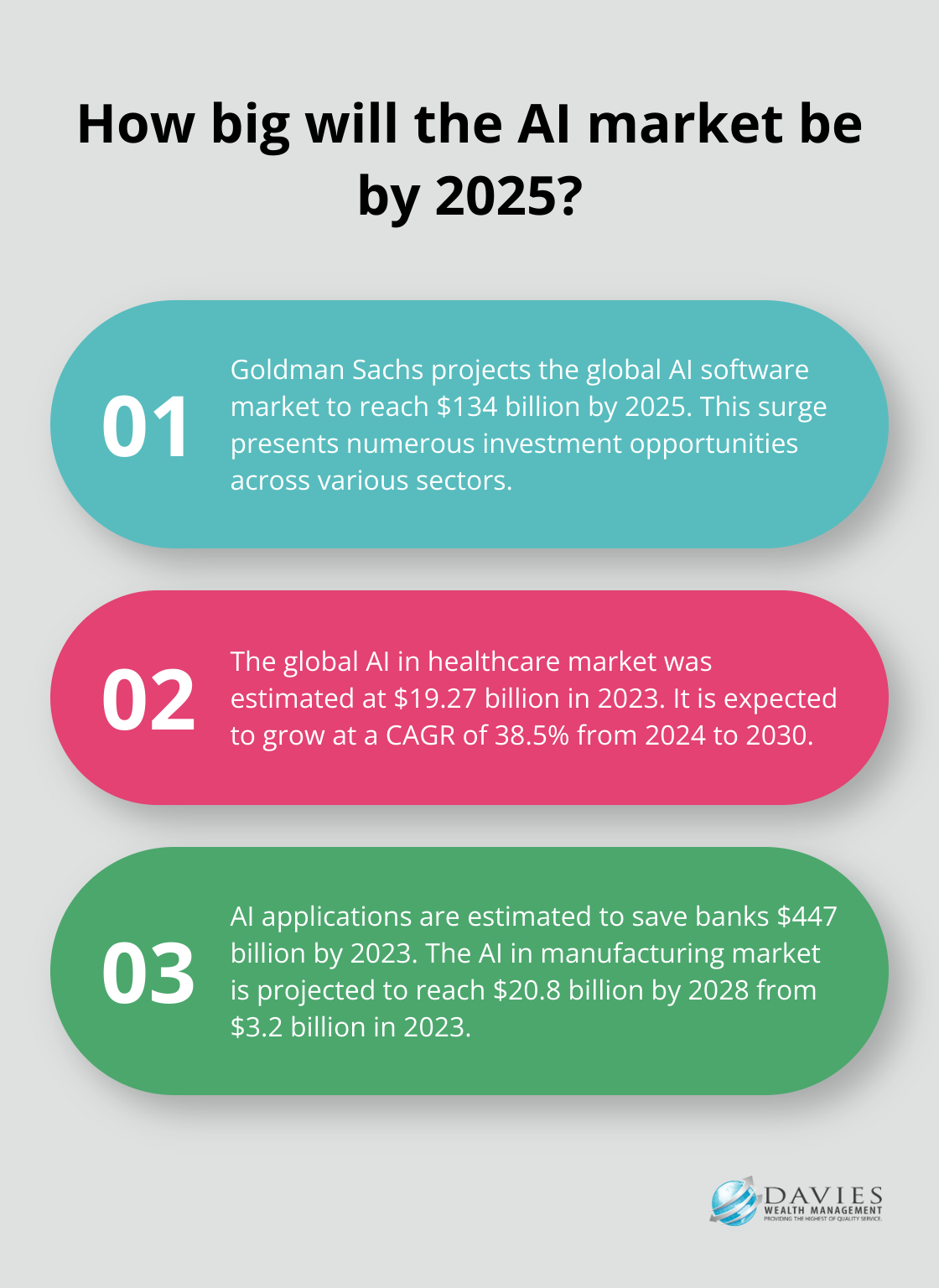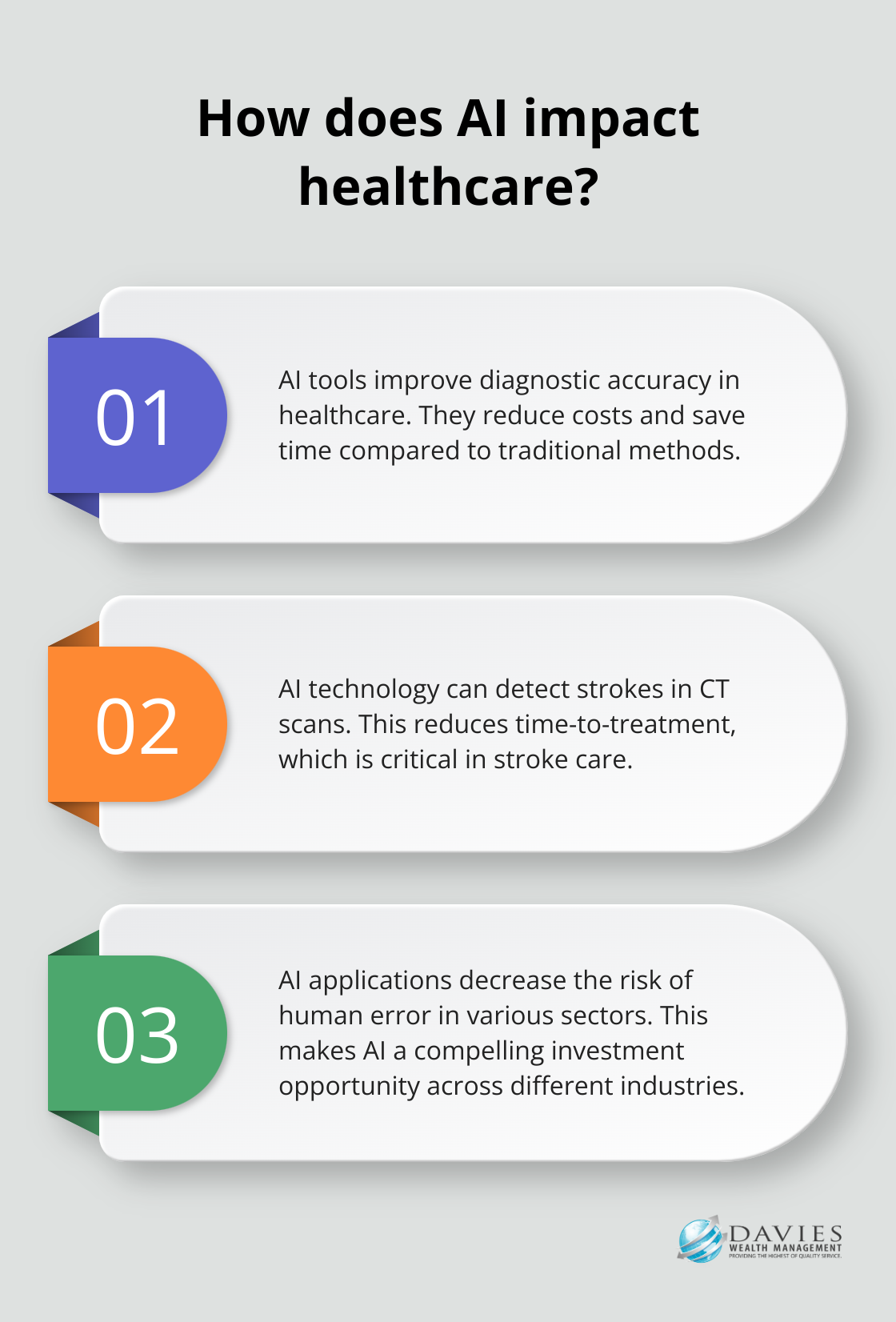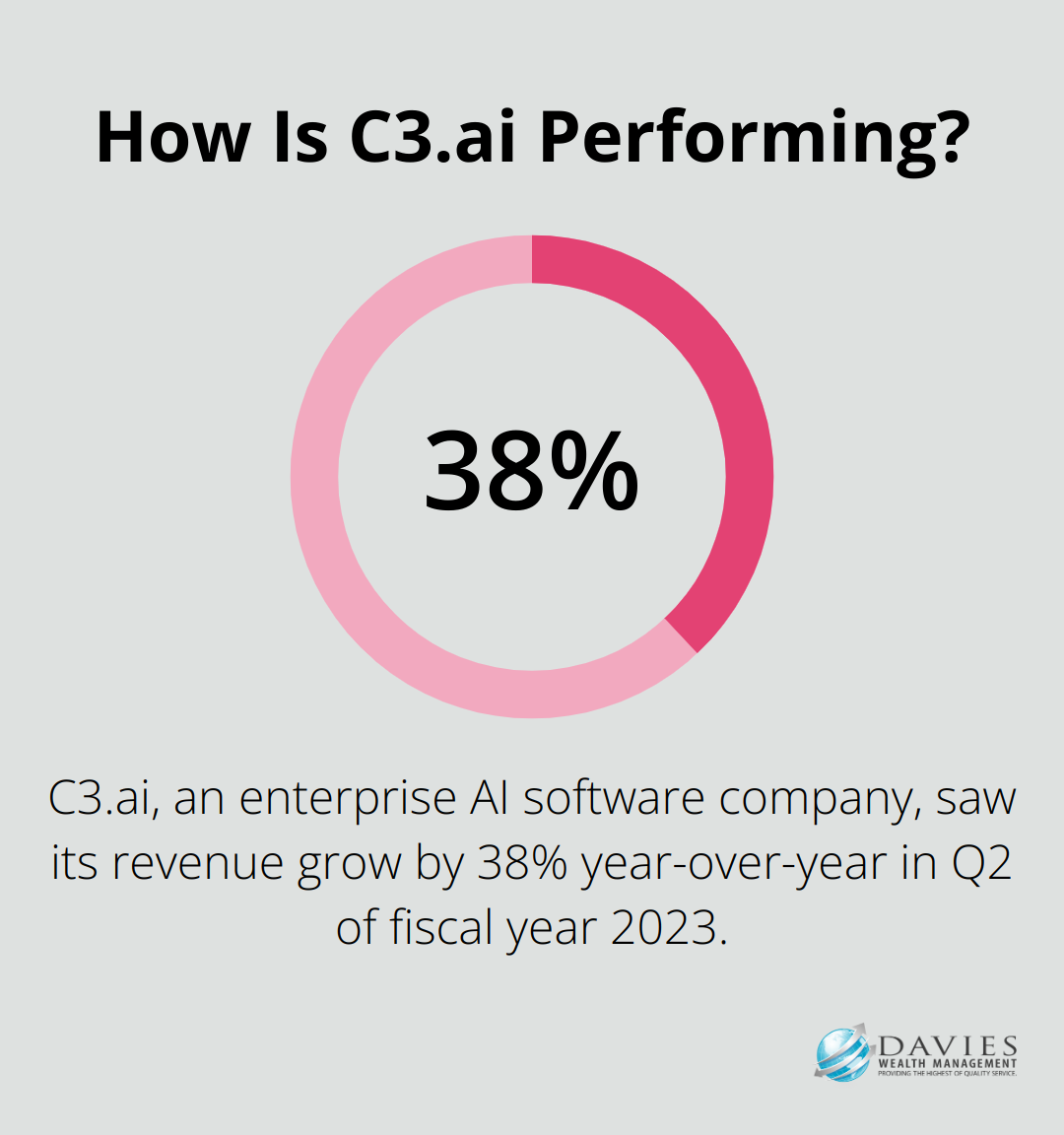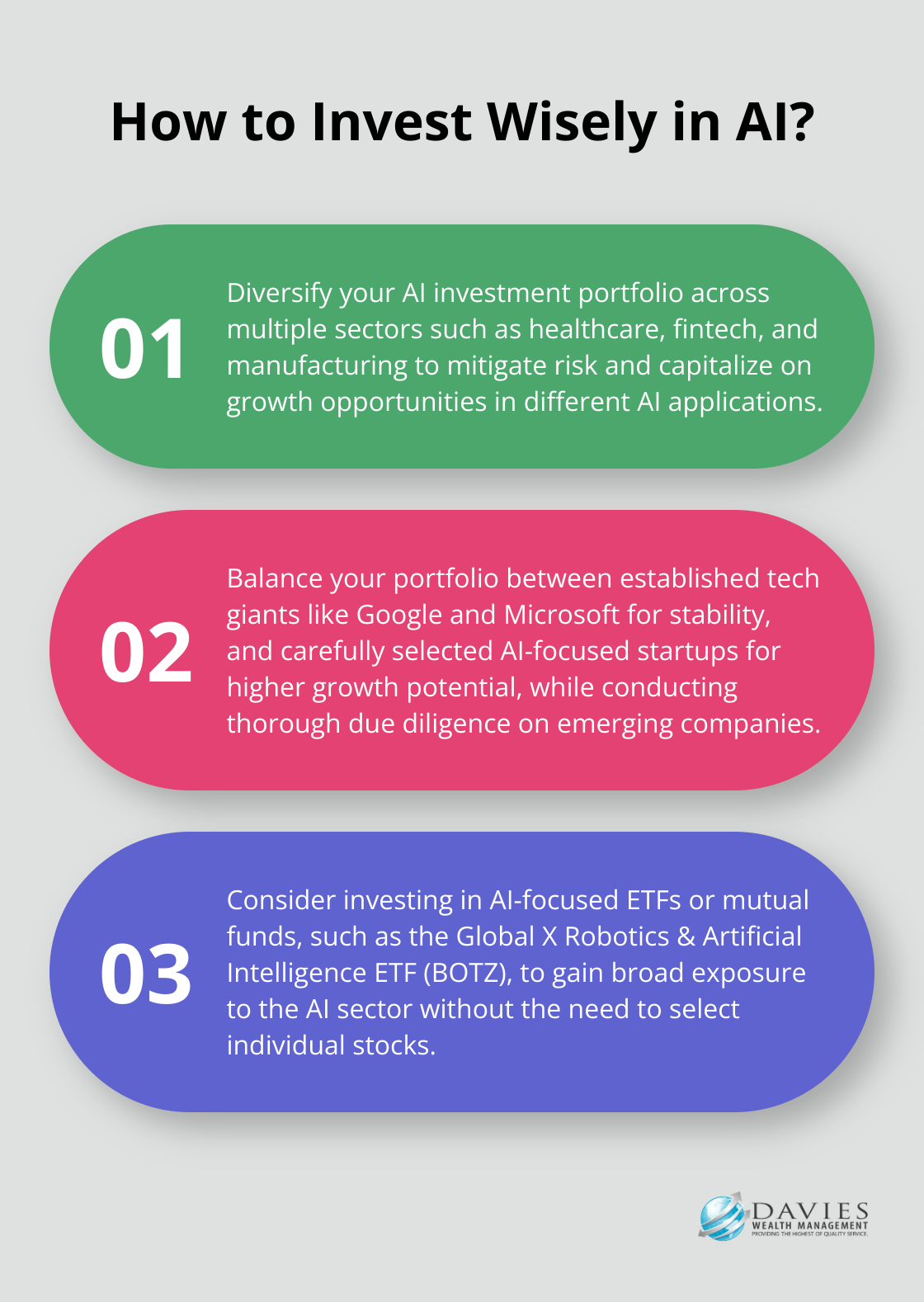Artificial Intelligence (AI) is reshaping the investment landscape, offering unprecedented opportunities for growth and innovation. At Davies Wealth Management, we’ve seen a surge in interest for AI investment strategies that can capitalize on this transformative technology.
This blog post will guide you through the process of creating effective AI investment strategies, from understanding market opportunities to building a diversified portfolio. We’ll explore key factors to consider and provide practical insights to help you navigate this exciting frontier in investing.
Where Are AI Investment Opportunities?
The AI market is experiencing explosive growth, with Goldman Sachs projecting the global AI software market to reach $134 billion by 2025. This surge presents a wealth of investment opportunities across various sectors and industries. Let’s explore key areas where AI creates potential for substantial returns.
AI in Healthcare
Healthcare stands out as one of the most promising sectors for AI investment. The global AI in healthcare market size was estimated at USD 19.27 billion in 2023 and is expected to grow at a CAGR of 38.5% from 2024 to 2030. AI applications in this sector include:
- Drug discovery
- Personalized medicine
- Diagnostic imaging
Companies like Recursion Pharmaceuticals use AI to accelerate drug discovery, while Butterfly Network revolutionizes medical imaging with AI-powered portable ultrasound devices.
AI in Financial Services
The financial services industry is another hotbed for AI innovation. AI finds applications in:
- Fraud detection
- Algorithmic trading
- Personalized financial advice
A report by Business Insider Intelligence suggests that AI applications are estimated to save banks $447 billion by 2023. Firms like Affirm use AI for credit scoring, while Robinhood leverages AI for its trading platform.
AI in Manufacturing
AI transforms manufacturing through:
- Predictive maintenance
- Quality control
- Supply chain optimization
The AI in manufacturing market size is estimated to reach USD 20.8 billion by 2028 from USD 3.2 billion in 2023, growing at a CAGR of 45.6%. Companies like Siemens and ABB lead the charge in implementing AI solutions for smart factories.
Established Tech Giants vs. AI-Focused Startups
When considering AI investments, it’s important to understand the landscape of companies involved. Established tech giants (like Google, Microsoft, and Amazon) have significant AI capabilities and resources. They invest heavily in AI research and development, integrating AI across their product lines.

On the other hand, AI-focused startups offer potentially higher growth opportunities (albeit with increased risk). Companies like C3.ai (focusing exclusively on enterprise AI software) or UiPath (specializing in robotic process automation) represent this category.
A balanced approach combines investments in established tech giants for stability with carefully selected AI startups for growth potential. This strategy allows investors to capitalize on the AI revolution while managing risk effectively.
The AI landscape evolves rapidly, and staying informed about the latest developments is essential for making sound investment decisions. As we move forward, let’s examine the key factors to consider when evaluating AI investment opportunities.
What Makes an AI Investment Worthwhile?
At Davies Wealth Management, we focus on several critical factors that determine the potential success and longevity of an AI venture. These considerations help us guide our clients towards sound investment decisions in this rapidly evolving field.
Technology Assessment and Real-World Impact
The first step in evaluating an AI investment involves an assessment of the technology’s practical applications. We look for AI solutions that solve real-world problems and have a clear path to market adoption. For instance, AI tools can improve accuracy, reduce costs, and save time compared to traditional diagnostic methods in healthcare. Additionally, AI can reduce the risk of human error, making it a compelling investment opportunity in various sectors.

Viz.ai serves as a prime example, using AI to detect strokes in CT scans. Their technology reduces time-to-treatment, which is a critical factor in stroke care. This clear, measurable impact on patient outcomes makes Viz.ai a compelling investment opportunity in the AI healthcare space.
Leadership and Talent: The Driving Force
The success of an AI company depends heavily on its leadership and talent pool. We scrutinize the backgrounds of founders and key team members, looking for a mix of technical expertise and business acumen. A strong AI company should have leadership with a track record of successful AI implementations and the ability to attract top AI talent.
Business leaders who understand AI can harness this power to make data-driven decisions, leading to improved strategies and outcomes. This understanding is crucial for the successful implementation and growth of AI technologies within a company.
Financial Health and Growth Trajectory
While many AI startups may not show profitability initially, we look for clear paths to profitability and strong growth indicators. Key metrics we consider include:
- Revenue growth rate
- Customer acquisition cost
- Customer retention rate
- Gross margin
For publicly traded AI companies, we also analyze price-to-sales ratios and compare them to industry averages.
Navigating the Regulatory Landscape
The AI field faces increasing regulatory scrutiny, making it important to understand the regulatory environment in which an AI company operates. We pay close attention to companies that proactively address ethical concerns and comply with data protection regulations like GDPR.
IBM’s approach to AI ethics, which includes principles like fairness, explainability, and transparency, positions the company well in an environment of increasing AI regulation. This proactive stance on ethics can significantly factor into long-term investment success.
As we move forward to explore strategies for building a diversified AI investment portfolio, these key factors will serve as a foundation for making informed investment decisions in the dynamic world of AI.
How to Build a Robust AI Investment Portfolio
At Davies Wealth Management, we have developed strategies to help our clients build robust AI investment portfolios. Our approach focuses on balancing risk and reward while staying ahead of the rapidly evolving AI landscape.
Diversification Across AI Sectors
One key strategy is to diversify investments across various AI sectors. This approach helps mitigate risk while capitalizing on the growth potential of different AI applications. You might allocate a portion of your portfolio to healthcare AI companies (like Recursion Pharmaceuticals), another to fintech AI firms (such as Affirm), and yet another to AI in manufacturing (with companies like Siemens or ABB).

A report by Grand View Research states that the global artificial intelligence market size was estimated at USD 196.63 billion in 2023 and is projected to grow at a CAGR of 36.6% from 2024 to 2030. This growth spans multiple sectors, underscoring the importance of diversification.
Balancing Established and Emerging Players
We recommend a balanced approach between established tech giants and emerging AI-focused startups. Companies like Google (Alphabet), Microsoft, and Amazon provide stability with their significant resources and broad AI integration. These tech giants allocated billions to AI research and development in 2022 (Alphabet spent $31.562 billion on R&D in 2022, much of it AI-focused).
On the other hand, AI-focused startups offer higher growth potential. For instance, C3.ai, specializing in enterprise AI software, saw its revenue grow by 38% year-over-year in Q2 of fiscal year 2023. However, these investments come with higher risk and require careful due diligence.
Leveraging AI-Focused ETFs and Mutual Funds
For investors seeking broader exposure to the AI sector, AI-focused ETFs and mutual funds can be valuable tools. These funds provide diversification across multiple AI companies and can be particularly useful for those who may not have the time or expertise to select individual stocks.
The Global X Robotics & Artificial Intelligence ETF (BOTZ) has seen a total return of 17.54% over the past 12 months as of January 2024. This type of fund allows investors to gain exposure to a range of AI companies without the need to pick individual stocks.
Exploring AI in Traditional Industries
Don’t overlook AI applications in traditional industries. Many established companies integrate AI to improve efficiency and competitiveness. For instance, John Deere has implemented AI in agriculture, using computer vision and machine learning to optimize crop spraying. This approach can uncover hidden AI investment opportunities in sectors not typically associated with cutting-edge technology.
We continuously monitor these trends and opportunities to ensure our clients’ portfolios are well-positioned to capitalize on the AI revolution while managing risk effectively. The key to successful AI investing is to stay informed, diversify wisely, and adapt your strategy as the technology and market evolve.
Final Thoughts
AI investment strategies have become essential in today’s rapidly evolving financial landscape. The potential for growth and innovation in AI spans across healthcare, financial services, manufacturing, and numerous other sectors. Investors who understand the key factors that make AI investments worthwhile and implement a diversified approach can position themselves to capitalize on this technological revolution.

Success in AI investing requires thorough research of potential investments, understanding of the underlying technology, and evaluation of real-world applications. Continuous learning about the latest AI developments, breakthroughs, and regulatory changes will help investors make more informed decisions. Every investor’s situation is unique, so seeking professional advice for personalized strategies can prove invaluable.
At Davies Wealth Management, we specialize in tailoring investment strategies to individual needs and goals (including those specific to AI investments). Our expertise in wealth management, combined with our understanding of the AI landscape, allows us to guide our clients through the complexities of this exciting investment frontier. The world of AI investing is dynamic and full of opportunities, and now is the time to consider how it can play a role in shaping your investment portfolio.



Leave a Reply